Big coffee ambitions, on wheels
Updated: 2016-11-11 12:34
By Xu Junqian in Shanghai(China Daily USA)
|
|||||||||
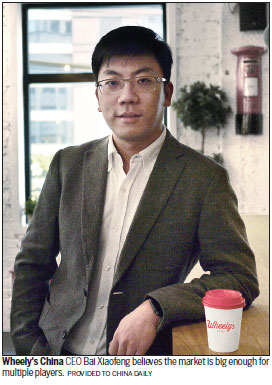
The founder of Wheely's China wants the brand's nimble coffee carts to outnumber Starbucks and Costa Coffee outlets within 10 years
The cafes that Bai Xiaofeng has been trying to introduce to China are dubbed the world's smallest of its kind in the world. And they're mobile, too.
First started in Sweden in 2014, the concept of Wheely's Coffee is that of "a solar-powered coffee cart that could take on Starbucks". Maria De La Croix, the founder of the brand, said that she came up with the idea after her job application for a Starbucks position in Stockholm was rejected.
The reason? Her hair was "too blue".
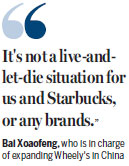
That incident turned out to be a blessing in disguise. In less than two years, De La Croix turned Wheely's Coffee into a global company with a presence in nearly 50 countries. The brand is also backed by enterprises from Silicon Valley, as well as a number of tech gurus including the creator of Gmail and founder of digital library Scribd, as it was deemed to embody the status-quo-disruptive ethos essential for entrepreneurship.
Bai, a former investment banker who spent several years in Silicon Valley, is now in charge of expanding the brand in China after striking up a partnership with De La Croix. China is currently home to about 50 million coffee drinkers.
But unlike the Danish entrepreneur, Bai isn't all that concerned about taking on the coffee giants.
"It's not a live-and-let-die situation for us and Starbucks, or any brands. China's coffee market is large enough for both, and more players," said the 33-year-old Shanghai native.
He believes that the diversity and population of China has segregated the domestic coffee market into distinct sectors that players can focus on - Starbucks, for example, are geared toward the above-thirty office workers who value accessibility, standards and speed.
In the case of Wheely's and other individual cafes, they are generally the destination of choice for the post-1990s generation who want fun and individualism in their cups of coffee.
There are currently five Wheely's coffee carts in Shanghai that are run by Bai's company Wheely's China. Additional carts run by independent franchisers in three to six cities could be making their debuts in the near future.
The set up costs of running a Wheely's mobile cafe starts from 100,000 yuan ($14,759), depending on the bike model. Wheely's China, which can provide business planning support to franchise owners, gets 10 percent of the revenue from each cart.
According to Bai, anyone can become a "Wheeler" but those who have prior experience in the service industry are favored. While franchise owners must sell Wheely's house coffee, they are permitted to personalize their own menus and include secondary products such as pastries, as well as pick their own locations to operate as long as they procure all the official documents required for a F&B business in China.
He estimated that by saving the rental and operational costs of running a centralized multinational company, Wheely's could reduce the retail price of a cup of coffee in China by 25 percent. This is a highly attractive proposition for not only customers, but also those with aspirations to run their own cafes.
Last month, at a meeting in Shanghai with potential franchise owners from all over China, Bai encouraged the audience to be creative with their coffee carts and offerings, suggesting that local foods such as Chinese pancakes and steamed buns could be a hit with domestic customers.
He also noted that the biggest challenge for franchise owners would be finding the right locations. However, because of the nature of the business, franchise owners are afforded a mobility that mitigates the damage caused by picking an unideal location. For instance, a Wheely's coffee cart that was situated at the entrance of a Carrefour supermarket for a test run was able to pack up and relocate after just one week due to low customer flow.
"Being small and mobile means being nimble and adaptive to changes, and perhaps more importantly, cost-effective," said Bai.
Looking ahead, Bai hopes to have more Wheely's carts in China than Starbucks and Costa Coffee outlets. Earlier this year, Starbucks announced that it would open one new outlet in China every day for the next five years, bringing the total to 5,000 by 2021. Consulting firm Euromonitor estimated that the two coffee giants currently account for around 82 percent of the market share in China.
"We don't want to be the number one player. I think coffee in China should be more fun and diversified," said Bai, who added that his 10 years in Australia has turned him into a firm believer in having a unique coffee culture.
"Starbucks is a great company in that it manages to get Chinese consumers to think about it whenever they want a cup of coffee. I want to achieve the same with Wheely's - I want people to associate us with a fun cup of coffee."
xujunqian@chinadaily.com.cn
- Online shopping frenzy sparks trash concern
- Is it a thing? 10 odd jobs where you can make good money
- Message on a bottle: Mineral water company launches drive to find missing children
- Snow leopards caught on camera
- A foreigner's guide to Singles Day shopping spree
- China jails 49 for catastrophic Tianjin warehouse blasts
- Americans want to change presidential election system
- UK business calls for exclusive visa system for post-Brexit London
- Australia poised to sign refugee deal with United States: media
- Philippines' Duterte says he is against 2014 defense pact with US
- S.Africa wants to work with US in promoting peace: Zuma
- Trump's victory on global pages

 Alibaba breaks sales record on Singles Day
Alibaba breaks sales record on Singles Day
 Ten photos from around China: Nov 4-10
Ten photos from around China: Nov 4-10
 Snow storm hits Xinjiang
Snow storm hits Xinjiang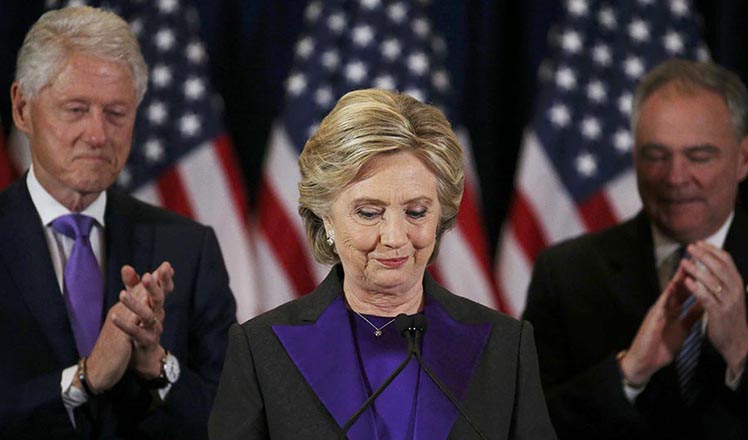
 Clinton concedes election, urges open mind on Trump
Clinton concedes election, urges open mind on Trump
 Places to enjoy golden gingko tree leaves
Places to enjoy golden gingko tree leaves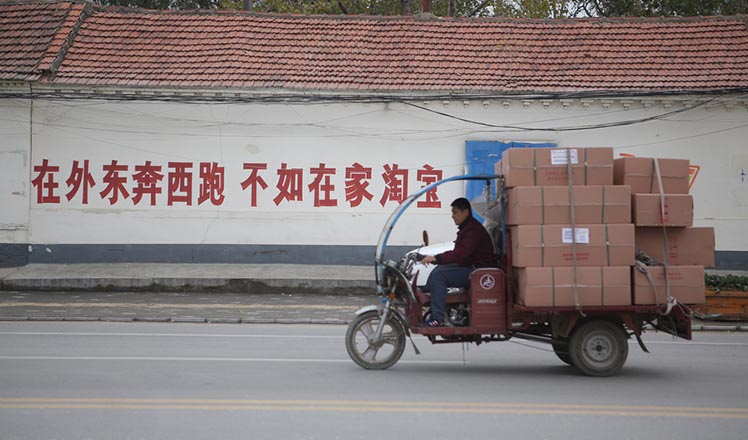
 Taobao village gets ready for shopping spree on 11/11
Taobao village gets ready for shopping spree on 11/11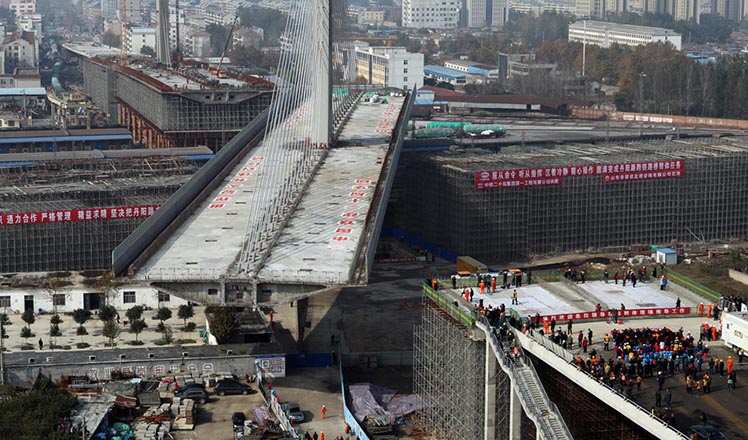
 Overhead bridge rotated in East China's Shandong
Overhead bridge rotated in East China's Shandong
 The 75th anniversary of Red Square parade celebrated
The 75th anniversary of Red Square parade celebrated
Most Viewed
Editor's Picks

|

|

|

|

|

|
Today's Top News
No environmental shortcuts
US election rhetoric unlikely to foreshadow future US-China relations
'Zero Hunger Run' held in Rome
Trump outlines anti-terror plan, proposing extreme vetting for immigrants
Phelps puts spotlight on cupping
US launches airstrikes against IS targets in Libya's Sirte
Ministry slams US-Korean THAAD deployment
Two police officers shot at protest in Dallas
US Weekly

|

|









